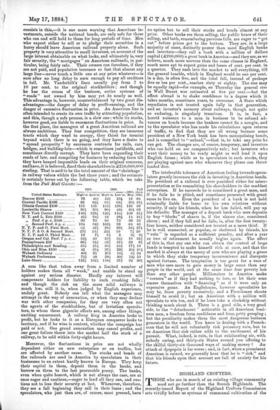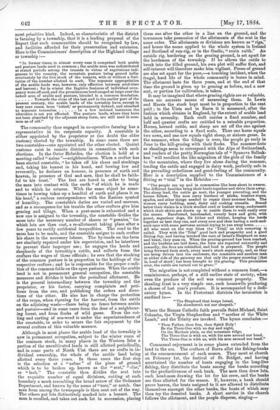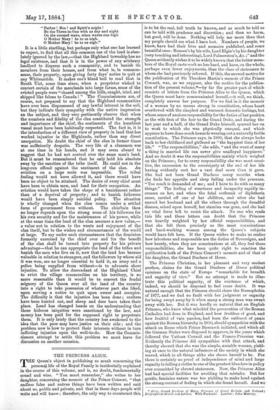HIGHLAND CROFTERS.
THOSE who are in search of an existing village community need not go farther than the Scotch Highlands. The recently-issued Report of the Highland Crofters Commission sets vividly before us systems of communal cultivation of the most primitive kind. Indeed, so characteristic of the district is farming by a township, that it is a leading proposal of the Report that such communities should be recognised by law, and facilities afforded for their preservation and extension. Here is the Commissioners' description of the Highland village or township :— " In former times, in almost every case it comprised both arable and pasture lands used in common; the arable area was redistributed at stated periods among the tenants in virtue of regulations indi- genous to the country, the mountain pasture being grazed indis- criminately by the live stock of the tenants, with or without a limi- tation of the number allotted to each. The separate appropriation of the arable lands was, however, only effective between seed-time and harvest ; for in winter the fugitive features of individual occu- pancy were eff aced, and the promiscuous herd ranged at large over the naked area of arable and pasture, blended in a common desolation.
Towards the close of the last and in the earlier part of the present century, the arable lands of the township have, except in very rare cases, been lotted,' or permanently defined, and attached
to separate tenancies In a few isolated instances the alteration is not yet effected. The pasture lands, where they have not been absorbed by the adjacent sheep farm, are still used in com- mon as of old."
The community thus engaged in co-operative farming has a representative in its corporate capacity. A constable is either appointed by the proprietor or (no doubt the older custom) elected by the township. In some cases there are two constables—one appointed and the other elected. Quaint customs exist in remote districts in connection with such elections. In the Outer Hebrides, the election is held at a meeting called " nabac "—neighbourliness. When a crofter has been elected constable, "he takes off his shoes and stockings and, taking his bonnet in his hand, and bowing low and reverently, he declares on honour, in presence of earth and heaven, in presence of God and men, that he shall be faith- ful to his trust." The feet are bared in order to bring the man into contact with the earth "of which he is made and to which he returns. With the same object he some- times in bowing takes up a handful of earth and places it on his head," a curious correspondence with the Eastern symbol of humility. The constable's duties are varied and onerous, and as a recompense for his trouble the other crofters give him grazing and tillage. When a peat-moss is exhausted and a new one is assigned to the township, the constable divides the moss into the necessary number of shares or "pennies," for which lots are then cast, a re-allotment taking place after a few years to rectify accidental inequalities. The road to the moss has to be made, and the constable assigns to each crofter his share in the necessary labour. The by-roads on the farm are similarly repaired under his supervision, and he interferes to prevent their improper use ; he engages the herds and shepherds of the township's cattle, and collects from the crofters the wages of these officials ; he sees that the stocking of the common pasture is in proportion to the holdings of the respective crofters ; and he is responsible for the proper cmadi- tion of the common folds on the open pastures. When the arable land is not in permanent general occupation, the constable measures and divides it before the periodical allotment. He is the general intermediary between the township and the proprietor, or his factor, carrying complaints and peti- tions from the one, and publishing the orders and direc- tions of the other. He also has In charge the protection of the crops, when ripening for the harvest, from the cattle on the adjoining waste—there being no fence between arable and pasture—and in some cases from the deer of a neighbour- ing forest, and from flocks of wild geese. Even the cut- ting and carting of sea-weed is under the superintendence of the constable, in order to secure the fair enjoyment by the several crofters of this valuable manure.
Although in most places the arable land of the township is now in permanent occupation, subject to the winter roam of the common stock, in many places in the Western Isles a portion of the uncultivated lands is still allotted periodically, and in some parts of North Mat there are no crofts in in- dividual ownership, the whole of the arable land being allotted every three years. In these cases the first step is the selection at a " nabac " of the piece of ground which is to be broken up, known as the "scat," " clar," or " leob." The constable then divides the scat into the requisite number of equal divisions, cutting at each boundary a mark resembling the broad arrow of the Ordnance Department, and known by the name of "tore," or notch. One man from among the townspeople is then sent out of the way. The others put lots distinctively marked into a bonnet. The man is recalled, and takes out each lot in succession, placing them one after the other in a line on the ground, and the townsmen take possession of the allotments of the scat in the same order. The allotments or divisions are known as "rigs," and hence the name applied to the whole system in Ireland and Scotland of run-rig, or in the Gaelic, " rouin ruith." An outside rig, bordering on the grazing ground, is set apart for the herdsman of the township. If he allows the cattle to break into the tilled ground, his own plot will suffer first, and self-interest will therefore make him vigilant. Pieces of ground are also set apart for the poor,—a touching incident, when the frugal, hard life of the whole community is borne in mind. The allotment lasts for three years, and at the end of that time the ground is given up to grazing as before, and a new scat, or portion for cultivation, is taken.
It may be imagined that where grazing rights are so valuable, there are accurate means of measuring them. In Lewis and Harris the stock kept must be in proportion to the rent paid ; in the Digs and in Barra it is measured, after the fashion which obtains in England, by the extent of arable land held in severalty. Each croft carries a fixed number, and half and quarter crofts are entitled to a rateable proportion. Horses, horned cattle, and sheep are set off the one against the other, according to a fixed scale. Thus one horse equals two cows, and one cow equals eight sheep, or sixteen geese. In the summer, when the tillage is over, the people go early in June to the hill-grazing with their flocks. The summer-huts or shealings seem to correspond with the Alps of Switzerland, and readers of the pretty Norwegian tale of " Synnove Solbak- ken "will recollect the like migration of the girls of the family to the mountains, where they live alone during the summer, tending the cattle and engaged in dairy work, perfectly safe in the prevailing orderliness and good-feeling of the community. Here is a description supplied to the Commissioners of a flitting or " trial " in the Hebrides :— "The people are up and in commotion like bees about to swarm. The different families bring their herds together and drive them away. The sheep lead, the cattle go next, the younger preceding, and the horses follow. The men carry burdens of sticks, heather-ropes, spades, and other things needed to repair their summer huts. The women carry bedding, meal, dairy and cooking utensils. Bound below their waists is a thick woollen cord or leather strap, underneath which their skirts are drawn up to enable them to walk easily over the moors. Barefooted, bareheaded, comely boys and girls, with gaunt, sagacious dogs, flit hither and thither, keeping the herds together as beat they can, and every now and then having a neck-and- neck race with some perverse animal trying to ran away home All who meet on the way bless the Trial,' as this removing is called. They wish the 'Trial' good luck and prosperity and a good flitting day, and having invoked the care of Israel's Shepherd on man and beast, they pass on. When the grazing-ground has been reached, and the burdens are laid down, the huts are repaired outwardly and inwardly, the fires are rekindled, and food is prepared. The people bring forward their stock, every man's stock separately, and, as they are being driven into the enclosure' the constable and another man at either side of the gateway see that only the proper seaming [that is, head of stook] has been brought to the grazing. This precaution over, the cattle are turned out to graze."
The migration is not completed without -a common feast,-.-a reminiscence, perhaps, of a still earlier state of society, when even the produce of the soil was common property. The shealing feast is a very simple one, each housewife producing a cheese of last year's produce. It is accompanied by a dedi- catory hymn. In the Protestant districts the invocation is confined to-
" The Shepherd that keeps Israel, He slumbereth not nor sleepeth."
Where the Roman Catholic faith prevails Saint Michael, Saint Columba, the Virgin Shepherdess and "mother of the White Lamb," and the Trinity are invoked. The hymn concludes :— " Thou Father, thou Son, thou Spirit Holy !
Be the Three-One with as day and night, On the Machair plain, on the mountain ridge, The Three-One is with us, with his arm around oar head,
The Three-One is with us, with his arm around our head."
Communal enjoyment is in some places extended from the land to the sea. The crofters of Barra allot the fishing-banks at the commencement of each season. They meet at church on February 1st, the festival of St. Bridget, and having ascertained the number of boats engaging in the long-line fishing, they distribute the boats among the banks according to the productiveness of each bank. The men then draw lots, each head-man drawing the lot for his crew, and the banks are thus allotted for the season. If, however, a bank should prove barren, the boats assigned to it are allowed to distribute themselves amongst the other banks, the boats of which may then try the deserted banks. A short service in the church follows the allotment, and the people disperse, singing-
" Father ! Son ! and Spirit's might ! Be the Three-in-One with us day and night On the crested wave, when waves ran high 0 Mother Mary ! be to ns nigh. 0 Mother Ifary ! be to ns nigh."
It is a little startling, but perhaps only what one has learned to expect, to find that all this common use of the land is abso- lutely ignored by the law,—that the Highland township has no legal existence, and that it is in the power of any arbitrary landlord to disperse such a community, and to banish its members from their homes, and from what is, in common- sense, their property, upon giving forty days' notice to quit at any Whitsuntide. It makes one's blood boil to read that in South 'Gist, some time since, when a proprietor wished to convert certain of the moorlands into large farms, some of the evicted people were "chased among the hills, caught, tried, and shipped like felons to Canada I " The Commissioners are, of course, not prepared to say that the Highland communities have ever been dispossessed of any lawful interest in the soil, but they indicate their sympathy with the native impression on the subject, and they very. pertinently observe that when the numbers and fidelity of the clan constituted the strength and importance of the chief, the sentiments of the humblest vassal must have been habitually respected. The fact is, it is the introduction of a different view of property in land that has worked injustice in the Highlands, rather than any direct usurpation. No doubt the chief of the clan in former times was sufficiently despotic. The very life of a clansman was at one time in his hands, and it may seem absurd to suggest that he had not control over the same man's land. But it must be remembered that he only held his absolute sway by the sanction of the tribe itself. He could not in the
long-run offend' against the sentiment of the clan. An eviction on a large scale was impossible. The tribal feeling would not have allowed it, and there would have been no object to be attained. The desire of every chief must have been to obtain men, and land for their occupation. An eviction would have taken the shape of a banishment rather than of a deprival of property ; and to banish followers would have been simply suicidal policy. The situation is wholly changed when the clan comes under a settled form of government from without. The chieftain then no longer depends upon the strong arms of- his followers for his own security and for the maintenance of his power, while at the same time. the land of the clan assumes a new value,— a value not in relation to the wants and enjoyment of the clan itself, but to the wishes and circumstances of the world at large. To say under such circumstances that the dominion formerly exercised by the chief over and for the benefit of the clan shall be turned into property for his private advantage—that he can appropriate the land of the tribes and banish the men who live on it, now that the land has become valuable in relation to strangers, and the followers by whose aid it was won, are no longer essential to hold it, an army and a police being supplied from without—is to advocate sheer injustice. To allow the descendant of the Highland " Chief to evict the village communities on his territory, is no more reasonable than it would be to convert the feudal seignory of the Queen over all the land of the country into a right to take possession of whatever part she liked, upon serving a notice to quit upon owner and occupier. The difficulty is that the injustice has been done ; crofters have been hunted out, and sheep and deer have taken their place. Land has changed hands on the understanding that these hideous iniquities were sanctioned by the law, and money has been paid for the supposed right to perpetrate them. It is only lately that the country has awakened to the idea that the poor may have justice on their side ; and the problem now is how to protect their interests without in turn inflicting injustice upon the well-to-do. How the Commis- sioners attempt to settle this problem we must leave for discussion on another occasion.




































 Previous page
Previous page